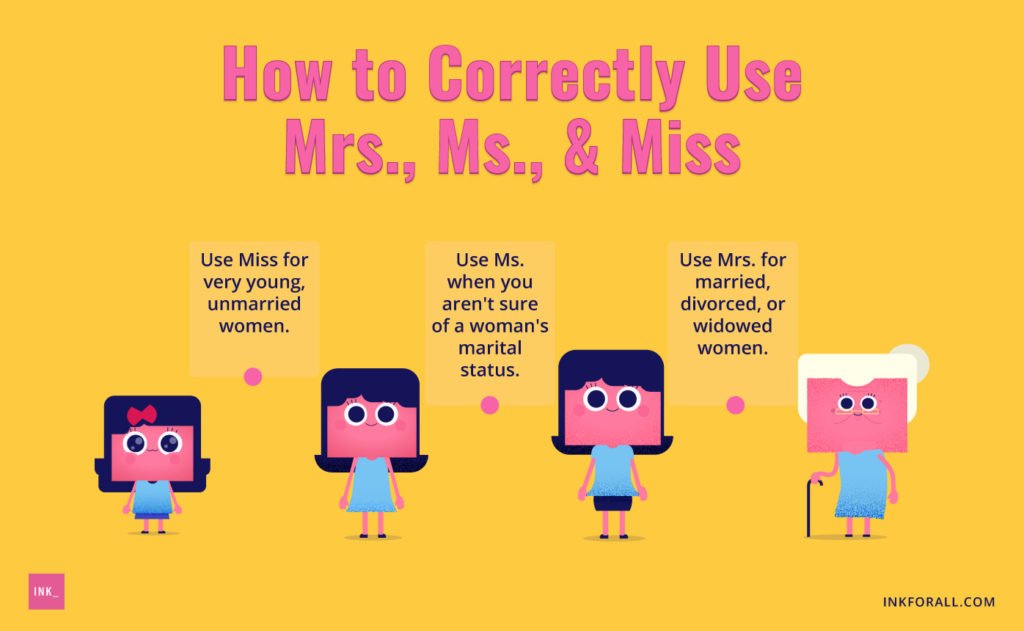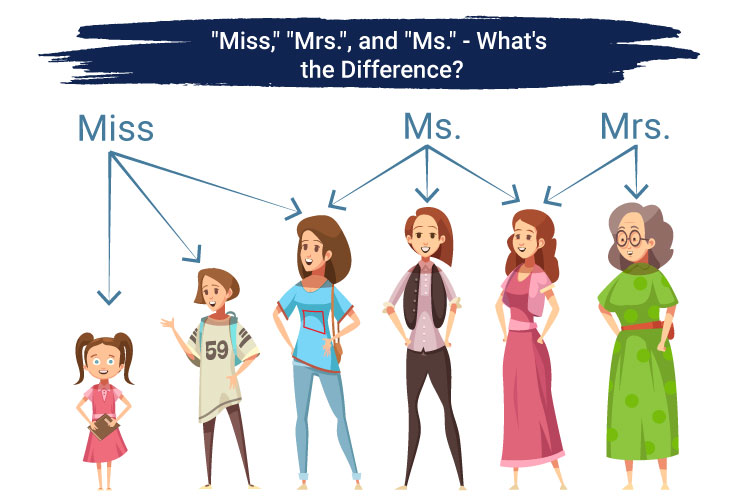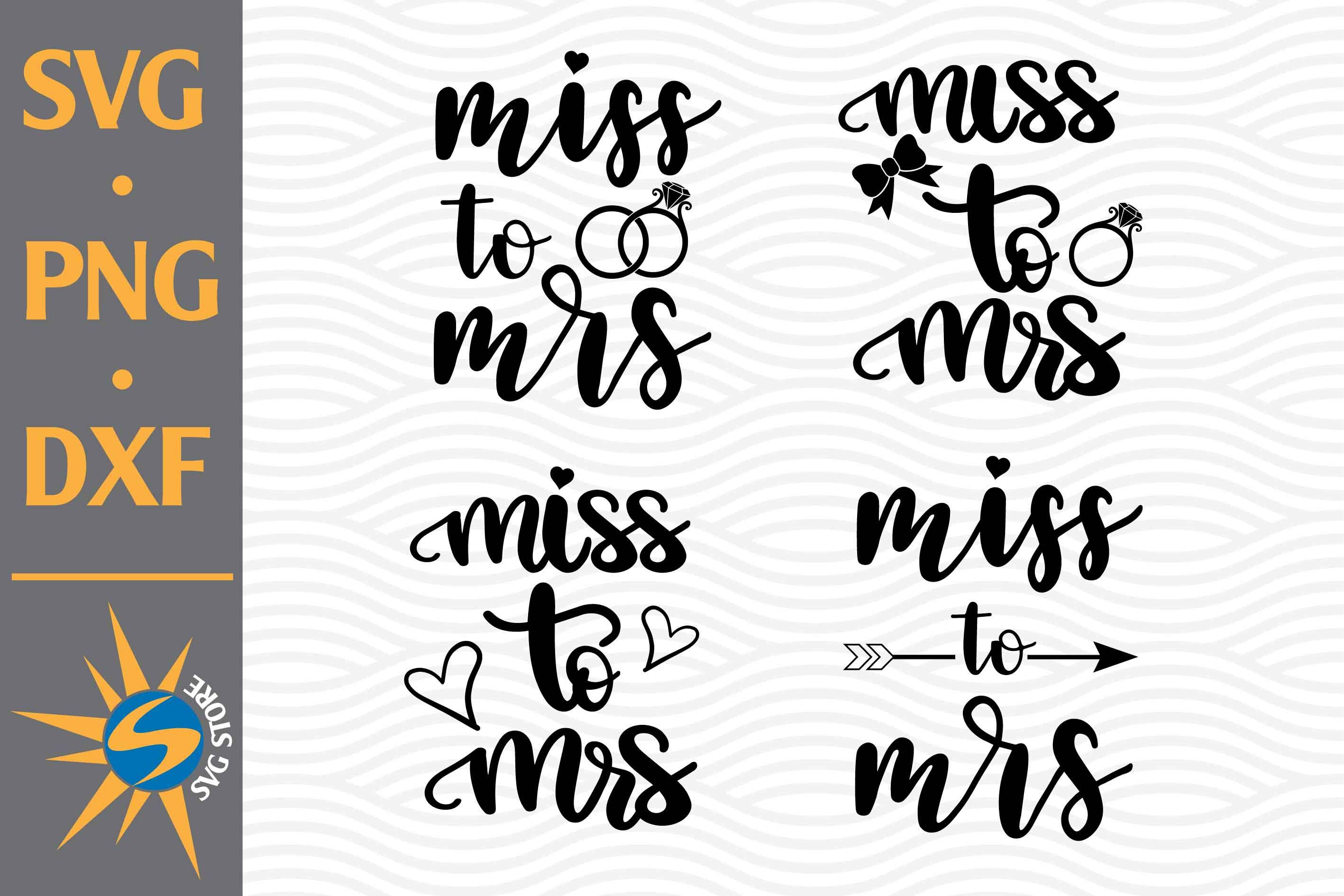
Miss Vs Ms. Vs Mrs. When To Address A Woman By Mrs., Ms., And Miss 7 E S L
Miss is used to describe a female child or an unmarried woman. Mrs. is the proper title of respect for women that are married or widowed. Ms. is different than Miss and Mrs. because it doesn't refer to marital status. This makes Ms. the perfect option if you aren't aware of which title to use.

Learn The Difference Between Miss, Mrs., And Ms., And Mx.
Miss. Like "Ms." and "Mrs.," the contraction "Miss" is short for "Mistress." It is used for an unmarried woman. It is highly appropriate to use "Miss" for a young girl or woman below marrying age. "Miss" can also be used for a previously married woman, but you should only use "Miss" if you know the woman uses this title for herself.

"Ms.," "Mrs.," or "Miss"?
Title and first name: Miss Christine. Ms. - The Game Changer. Ms. is the adult title for those who identify as women and either are independent or are married but wish to use the title Ms. instead of Mrs. Ms. came into being in the 70's and has been a game changer. It allowed for married and unmarried adult women to have a title that was on.

Miss To Mrs svg file Engagement svg instant download Use Etsy
Miss, Mrs., and Ms., while all titles used for women, have very different implications. "Mrs." is used for a woman who is married (or who has been married, since she may be widowed or divorced) and has taken her husband's name. "Miss" is a title of respect used for an unmarried woman or a young girl. "Ms." can be used for a.

Miss to Mrs. Hand Lettered Cut File SVG PNG EPS DXF
Female Honorifics: Miss, Mrs. and Ms. Traditionally, female honorifics are based on a woman's marital status: "Miss" refers to an unmarried woman. "Mrs." refers to a married woman. These are still common today. However, we don't always know the marital status of the person we're addressing. And some women prefer not to be defined.

Is it Mrs. or Ms. or Miss? How to Address Women With Respect INK Blog
Mrs. Mrs. is a title used before a surname or full name of a married female. Mrs. is an abbreviation for the word Missus, it is pronounced like the word Missus. The abbreviation Mrs. has been in use since the sixteenth century, it is a variant of the word mistress. Ms.

Miss to Mrs Printable Sign Etsy
The Meaning of Mrs. Mrs. (pronounced MIS-iz) is similar to Miss, except that it refers to a married woman. The other difference is that Mrs. is not used as a stand-alone title; to be polite in addressing a married woman without including her last name, speakers of American English would often refer to her as ma'am. Examples

How to Use Personal Titles Mr., Mrs., Ms. and Miss ESLBUZZ
Historically, "Miss" has been the formal title for an unmarried woman, while "Mrs." refers to a married woman. "Ms." is used by and for unmarried and married women.

What's the Difference Between Miss, Ms., and Mrs.?
The title Ms. is an honorific used to refer to any woman, regardless of marital status. Generally speaking, it is considered proper etiquette to use Mrs. to refer to married women, Miss to refer to unmarried women and young girls, and Ms. to refer to a woman of unknown marital status or when marital status is irrelevant.

Miss to Mrs SVG File File for Decal Tshirt Apparel Cricut Etsy
Geraldine Downer, 40, from Mexico City who is married explains why she uses Ms. "I live in Mexico, where it's not obligatory to change your surname when married. "I have been married for nearly.

How to Know the Difference Between Miss, Mrs., and Ms. Grammarly
Ms. vs Mrs. - What's the Difference Ms., Miss and Mrs. are three different ways to address women, normally as a title used before a surname. The words have very different contexts, however, and using them incorrectly can make your writing seem clumsy and even cause offense.

Miss to Mrs. Hand Lettered Cut File SVG PNG EPS DXF
Mrs (pronounced [ miss -iz]) is used to address a married woman of any age. Miss (pronounced [miss]) is used to address a young unmarried woman or girl. Table of contents Miss vs Ms How to use Ms How to use Mrs How to use Miss What does Mx mean? Punctuation with Ms, Mrs, Miss, and Mx Frequently asked questions Miss vs Ms

Miss And Mrs. Cops Dramaqu Kordramas Two Cops Kita / There are no featured reviews for because
What Does Miss Mean? Traditionally, "Miss" is used to address an unmarried woman. The term came about in the late 1700s as a way to refer to an unmarried woman with a high social status. Pronunciation of Miss The title "Miss" is pronounced phonetically, or exactly how it looks. The word "Miss" rhymes with "hiss" or "this."

"Miss," "Mrs.", and "Ms."What's the Difference?
Ms. is a general title that does not indicate marital status but is still feminine. Mrs. is a traditional title used for a married woman. Miss is a traditional title used for an unmarried woman. Mx. is a title that indicates neither marital status nor gender. Uses of Miss

Miss To Mrs SVG, PNG, DXF Digital Files Include By TheHungryJPEG
Ms. is a more universal alternative and you won't break your head thinking if you've made an uncomfortable situation. If you're in a business setting, this certainly shouldn't happen. To sum it up, if you're addressing young women that are 18 or younger, Miss is a safe bet.

Miss to Mrs Box The Ultimate Bridal Subscription Service Modern MOH
Mrs. (pronounced [ miss -iz]) is used to address a married woman of any age. Miss (pronounced [miss]) is used to address a young unmarried woman or girl. Table of contents Miss vs. Ms. How to use Ms. How to use Mrs. How to use Miss What does Mx. mean? Punctuation with Ms., Mrs., Miss, and Mx. Other interesting language articles